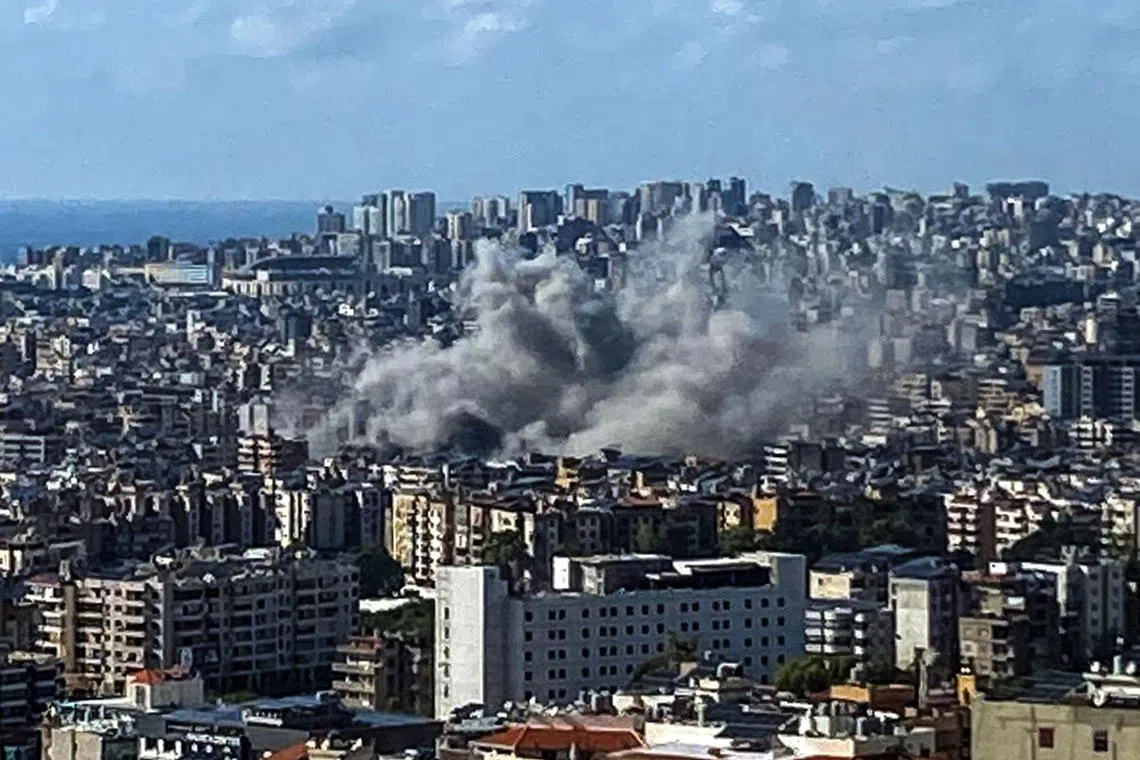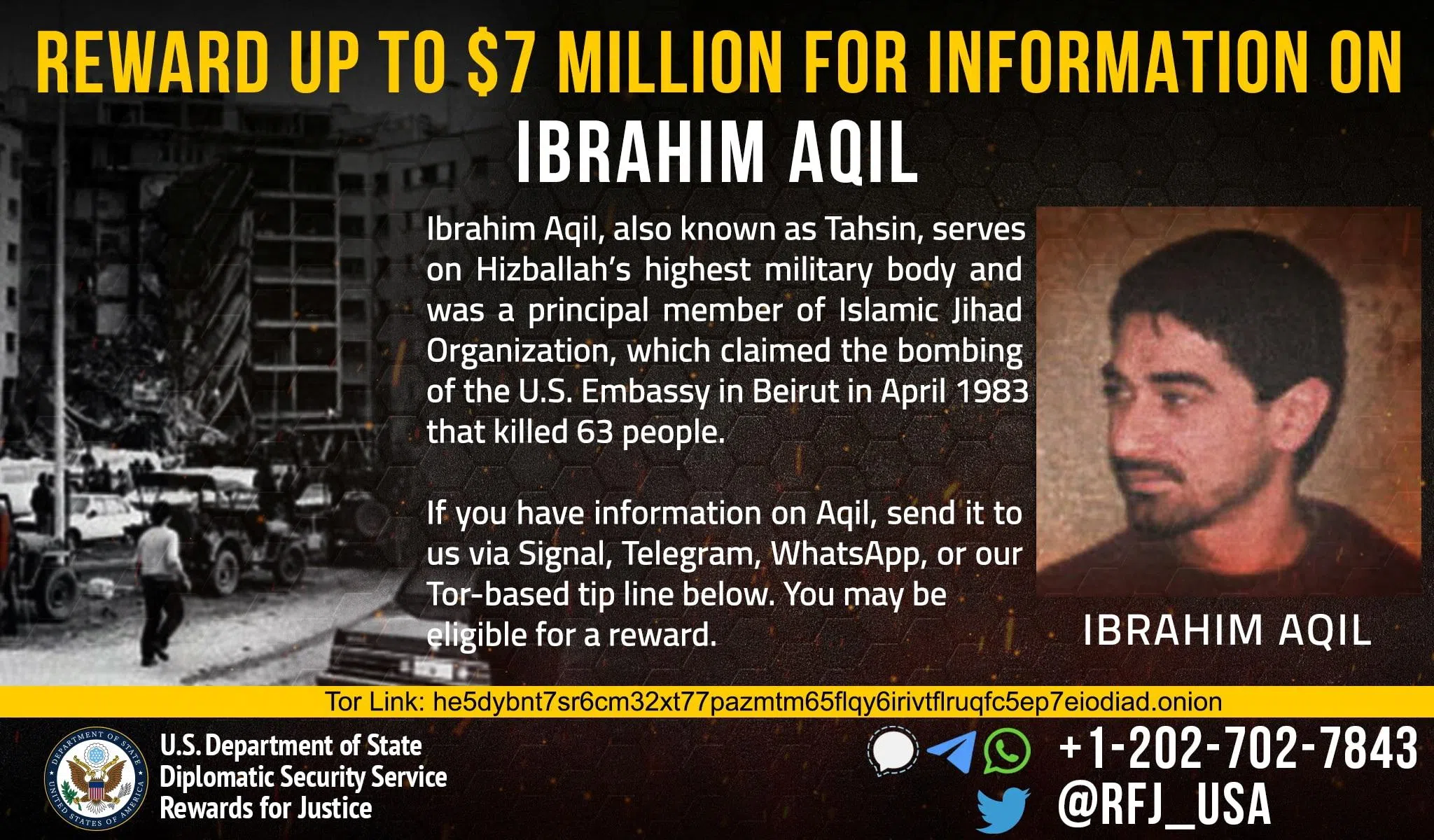Top Hezbollah commander among 14 killed in Israeli strike on Beirut
Sign up now: Get ST's newsletters delivered to your inbox
BEIRUT/JERUSALEM - Israel killed a top Hezbollah commander and other senior figures in the Lebanese movement in an airstrike on Beirut on Sept 20, vowing to press on with a new military campaign until it is able to secure the area around the Lebanese border.
The Israeli military and a security source in Lebanon said Ibrahim Aqil had been killed along with other senior members of an elite Hezbollah unit in the airstrike, sharply escalating the year-long conflict between Israel and the Iran-backed group.
Lebanon’s health ministry said at least 14 people died and the toll was expected to climb as rescue teams worked through the night. It was not immediately known whether the toll included Aqil and the other senior Hezbollah commanders.
Earlier, the military said at least 66 people were injured, nine of whom were in critical condition.
A second security source said the attack was carried out with multiple missiles that blasted into the opening of a building’s garage. The explosion tore into the building’s lower levels as Akil met other top commanders inside.
Witnesses reported hearing a loud whistling and several consecutive blasts at the time of the strike.
In a brief statement carried by Israeli media, Prime Minister Benjamin Netanyahu said Israel’s goals were clear and its actions spoke for themselves.
Defence Minister Yoav Gallant, who has said this week that Israel is launching a new phase of war on the northern border, posted on X: “The sequence of actions in the new phase will continue until our goal is achieved: the safe return of the residents of the north to their homes.”
Hezbollah made no statement on the Israeli strike or Aqil’s fate. Its media office issued two statements on the night of Sept 20 saying the group had fired rockets at two Israeli positions at 8.40pm, hours after the attack that killed him.
Tens of thousands of people have been evacuated from homes on both sides of the Israel-Lebanon border since Hezbollah began rocketing Israel in what it says is sympathy with the Palestinians in parallel to the war in Gaza.
Israel, which last fought an all-out war against Hezbollah 18 years ago, has said it will use force if necessary to ensure its citizens can return.
The Israeli military described Aqil as the acting commander of the Radwan special forces unit, and said it had killed him along with around 10 other senior commanders as they met. Aqil sat on Hezbollah’s top military council, sources in Lebanon told Reuters.
The strike inflicted another blow on Hezbollah after two days of attacks on the group in which pagers and walkie-talkies used by its members exploded,
Local broadcasters showed groups of people gathered near the site, and reported they were searching for people who had been in the vicinity and were still missing, most of them children.
Drones were still flying over Beirut’s southern suburb hours after the strike.
“We are not afraid, but we want a solution. We cannot continue with the country like this,” said Mr Alain Feghali, a resident of Beirut who spoke to Reuters. “War? I don’t know if it started or not, but nothing is reassuring. It is clear that the two sides will not stop.”

Thick smoke rising above the southern suburbs of Beirut after an Israel strike on Sept 20.
PHOTO: AFP
The UN Special Coordinator for Lebanon, Ms Jeanine-Hennis Plasschaert, said the Sept 20 strike in a densely populated area of Beirut’s southern suburbs was part of “an extremely dangerous cycle of violence with devastating consequences. This must stop now.”
The strike marked the second time in less than two months that Israel has targeted a leading Hezbollah military commander in Beirut. In July, an Israeli airstrike killed Fuad Shukr,
Aqil had a US$7 million (S$9 million) bounty on his head from the US over his link to the deadly bombing of Marines in Lebanon in 1983, according to the US State Department website.
The Israeli military said Aqil had been head of Hezbollah operations since 2004 and was responsible for a plan to launch a raid on northern Israel, similar to the Hamas-led attack on southern Israel on Oct 7

Ibrahim Aqil had a US$7 million (S$9 million) bounty on his head from the US, over his link to the deadly bombing of Marines in Lebanon in 1983.
PHOTO: REUTERS
“The Hezbollah commanders we eliminated today had been planning their ‘Oct 7’ on the northern border for years,” Israeli army chief Herzi Halevi said.
“We reached them, and we will reach anyone who threatens the security of Israel’s citizens.”
Rubble and burnt-out cars
The Israeli military reported warning sirens sounded in northern Israel following the Beirut strike. Israeli media reported heavy rocket fire in northern Israel.
Hezbollah said it had twice fired Katyusha rockets at what it described as the main intelligence headquarters in northern Israel “which is responsible for assassinations”.
White House national security spokesperson John Kirby said he was not aware of any Israeli notification to the US before the Beirut strike, adding Americans were strongly urged not to travel to Lebanon, or to leave if they are already there.
However he added that, “war is not inevitable... and we’re going to continue to do everything we can to try to prevent it.”
“The IDF (Israel Defence Forces) conducted a targeted strike in Beirut. At this moment, there are no changes in the Home Front Command defensive guidelines,” the Israeli military said.
The current conflict between Israel and Hezbollah, ignited by the Gaza war, has intensified significantly this week.
On the night of Sept 19, the Israeli military carried out its most intensive airstrikes in southern Lebanon since the conflict erupted almost a year ago.
The conflict between Israel and Hezbollah is the worst since they fought a war in 2006. Tens of thousands of people have had to leave homes on both sides of the border.
While the conflict has largely been contained to areas at, or near the frontier, this week’s escalation has heightened concerns that it could widen and further intensify.
Israeli newspapers reported that due to the situation, Mr Netanyahu had delayed his trip to New York for the United Nations General Assembly next week by a day and would arrive on Sept 25.
The Iranian embassy in Lebanon said it “condemns in the strongest terms the Israeli madness that crossed all lines with targeting residential buildings in Beirut’s southern suburbs”. REUTERS


